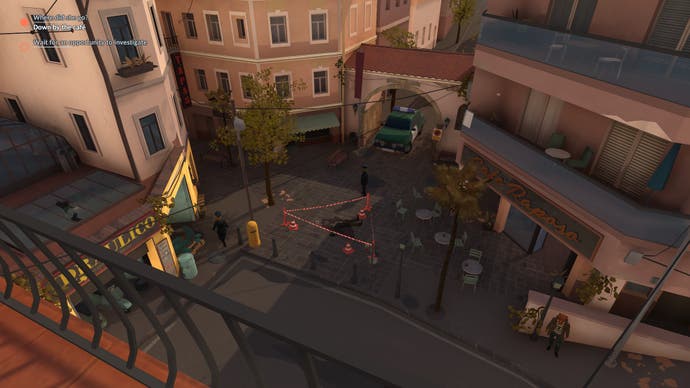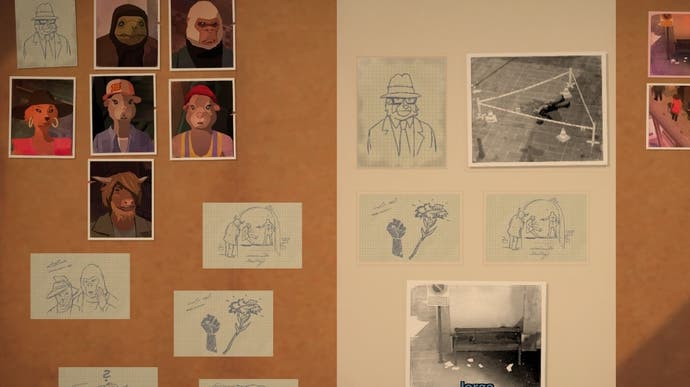The Flower Collectors review - a simple but full-hearted spin on Rear Window
Planting evidence.
Rear Window is absolutely perfect video games fodder. Hitchcock's classic, self-contained thriller about a man solving a neighbourhood murder while confined to the four walls of his apartment has been spoofed and refernced so many times in popular culture, in fact, that I'm sort of amazed it hasn't been made into a game already.
Perhaps that's because Hitchcock, more than your Lovecrafts and your Geigers and other beloved inspirations of games, is a bit intimidating. It's not just a mood or a vision that you're riffing on, but a craft, and a very famously well-honed craft at that. I don't blame people for giving him a wide berth, basically, and it likewise means I have huge admiration for Mi'pu'mi Games, the small independent studio that's opted to finally take him on with The Flower Collectors.
What that studio has managed is a very likeable effort, even if it's not a perfect one. Instead of New York in the 50s, The Flower Collectors is set in the hazy angst of Barcelona in the 70s. The undercurrents here, rather than the moral quandary of privacy and domestic life of Rear Window, are somewhat greater: in the 70s Spain is in political turmoil, as facsism looks to take a worrying hold on the nation and police and state - in the form of the infamous Flower Collectors group - clamp down brutally on minorities, artists, and anyone else seen as an enemy of "tradition" and "order".
It's a great idea, the story being modernised by its use of the past, and it makes for a mostly engrossing one at that. You're placed right along the moral fault line as Jorge, a forcefully retired police officer investigating this murder out of pure moral duty but doing so, you soon realise, against your own, earlier values, against your old friends, and against who you thought you were. It turns out your old self can't put up much of an argument - this game is not subtle in its parable, as much as the parable is worth telling - but the story becomes one of redemption as much as revelation, forgiveness as much as clear right and wrong. In this sense it's quite deftly handled: through gradual realisations, points of reflection, moments of genuine and human conflict. And it's delivered at a steady but still genuinely quite gripping pace.
The actual mystery itself is intriguing enough, too. It's typical corruption and political intrigue stuff but the sheer enthusiasm of the voicing cast carries it, and likewise that commitment goes some way to covering for the fairly bare-bones animation. The Flower Collectors feels a little premature, on that front - maybe very premature, if I'm really being honest - with the interactions you spy on mostly boiling down to one of three Sims-like expressions. Everyone's either slapping their knees with hilarity or stamping their feet with rage, until they go entirely static to turn in place and walk off. And yet, it's all still quite charming. The movements of the little people of the town below you working together like a little dance, inside a little diorama.

Your means of investigation is pretty simple, again. Unable to leave your apartment because of the wheelchair you get a pair of binoculars or a camera with which to watch the game unfold from the balcony, and instead you must signal Melinda, a spunky, rebelliously left-wing journalist, to do the real snooping for you (it is very Rear Window). There are few if any fail states: you'll need to navigate her past some patrolling Policia, for instance, but she won't move until the coast is clear. You'll need to pin photos and sketches of your observations to a board in the right order, but things won't progress until you take the right photos and won't fail if you pin them up back-to-front. Clearly that's intentional, taking any risk of jarring failure out of the equation to let you sit back in your chair a little and enjoy the mystery as it unfolds for you, but the consequence is that it also shifts the focus back onto the drama itself, and then the comparisons with the real deal begin and The Flower Collectors struggles, really, to hold up.
The great secret of Hitchcock is his restraint - not in effects or panache, which he's full of, but in restraint of the story, the setting, the things that are on screen. In under two hours and with nothing but a single set little larger than a west end theatre, he finds immense humanity and emotional detail. This comes from the small things, from intimacy, and that's where you can't cut corners. Too often, instead, I found myself looking into the game's empty apartments or alleyways, hoping to catch someone unrelated to the plot just going about their daily life, longing for a glimpse of that special kind of humanity that can only be found in the mundane. The Flower Collectors tells an important story with earnest performances, but aside from keeping it to a tight three hours the restraint's all in the wrong places.










